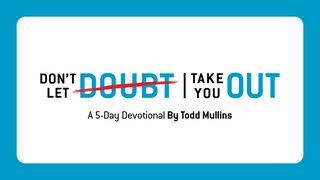What the Bible Says: The Blessing of God’s WillSample

Blessing #6: We can reduce subjectivity.
Subjectivity involves emotional choices, making decisions detached from any verifiable facts. Feelings and hunches rule a subjective person. In the train of life, emotions make a great caboose, but they make a lousy engine. When emotions take the lead, they can really lead you astray. If anger, euphoria, or even boredom is the primary motivation behind a decision, you should wait for a better reason. If you reflect back on the decisions in your life that you most regret, how many were emotional, spur-of-the moment decisions? An emotional decision will gratify you for a short time but can shame you for a lifetime. Do not make emotional decisions.
Sometimes we think strong feelings are proof of God’s will. Powerful emotions, such as that feeling of first falling in love, can influence us to make rash, unwise decisions. Instead of following our hearts, God expects us to use our minds and His wisdom when we make decisions, which can greatly reduce dangerous emotionalism.
The fact that God knows what you will choose does not mean you must choose the right thing. Desperate to discover this elusive “God’s will for me,” people reach foolish, subjective conclusions. When this becomes a pattern, we are being led around by our emotions, and this elevation of emotions to a place of authority in our lives causes misapplication of Scripture and dangerous decision-making. A common example is the way Christians handle Colossians 3:15, which Paul included in a series of practical instructions about living with other believers in the fallen world. He wrote, “And let the peace of Christ rule in your hearts, to which indeed you were called in one body. And be thankful.”
Since the time I was very young, I was taught that a key element in making good decisions is the question, “Do you have a sense of peace about it?” After all, as long as you feel peaceful inside, the decision must be the right one, right? Among Christians, the standard of “having peace” is primarily derived from this verse, which has nothing to do with wise decision-making.
Here’s the argument: “Pastor James, I’ve really studied Colossians 3:15. The word rule means direct or act as an umpire, so the verse means that we must let God‘s peace act as an empire. What I’ve discovered is that when I’m out of God’s will, I feel anxiety and discomfort, which feels an awful lot like an umpire’s whistle. But when I’m in God’s will, I feel peace, which is the Holy Spirit’s confirmation that I’m doing God‘s will. As long as I have that sense of peace, I know I’m in God’s will for me.”
But let’s go back to Scripture and check the context of this verse. This entire chapter is all about living as a person who has been “raised with Christ” (3:1). It includes a series of broad commands that give us reliable direction:
“Seek the things that are above” (3:1).
“Set your minds on things that are above” (3:2).
“Put to death therefore what is earthly in you” (3:5).
“Put on then, as God’s chosen ones, holy and beloved, compassionate hearts, kindness, humility, meekness, and patience” (3:12).
“Put on love” (3:14).
“And let the peace of Christ rule in your hearts” (3:15).
“And be thankful” (3:15).
“Let the word of Christ dwell in you richly” (3:16).
“Do everything in the name of the Lord Jesus” (3:17).
That “peace priority” looks a little different among the active commands that surround it. How often do we miss opportunities to put all the other commands on this list into practice while we passively “wait for peace”? The last four items on the list above are results that follow practicing the first five commands. And we cannot miss the tone of this entire passage. The context is relational strife. The heart of this chapter isn’t verse 15 but verses 12 and 13. Read them slowly: “Put on then, as God’s chosen ones, holy and beloved, compassionate hearts, kindness, humility, meekness, and patience, bearing with one another and, if one has a complaint against another, forgiving each other; as the Lord has forgiven you, so you also must forgive” (Col. 3:12–13).
According to God’s Word, we must forgive, we must love, and we must work toward relational peace with all people. Romans 12:18 drives home this point: “If possible, so far as it depends on you, live peaceably with all.” That’s the point of Colossians 3:15. It has absolutely nothing to do with a peaceful sense of finality in a decision about something uncertain as a signal for me that God agrees and everything to do with forging relational peace.
So let’s declare a moratorium on asking people if they have peace about their decisions. Hard, truthful, God-honoring decisions often come with feelings like fear, discomfort, and even pain. Meanwhile, countless willfully sinful actions are taken by people who report feeling at peace about their choices.
If that challenges our traditional thinking, we can study Jesus in the Garden of Gethsemane. Was Jesus following God’s will? Perfectly, always. “Not my will, but yours, be done,” Jesus prayed (Luke 22:42). Did Jesus feel a sense of peace? No! In fact, the tension of obedience to God was so great that Jesus seat “great drops of blood” (22:44). Peace is not primarily about feelings but about the cooperation of truth and action. Jesus never lost the state of peace with God because He willingly accepted feelings that were anything but peaceful. Let’s dispense with the notion that obedience to God always brings good feelings and that disobedience brings anxiety.
Peaceful feelings are simply not a reliable indicator of wise decision-making. Relying on peaceful feelings can lead to awful decisions. By recognizing that God’s will is that we apply His wisdom and guidance to our decision-making, we reduce the subjectivity of our choices.
For seven days we’ve considered the blessings that flow from conforming our beliefs to Scripture. God’s Word leads us to set aside the notion that we are seeking a personalized, customized will of God for our lives. We replace that doomed quest with obedience to God’s Word in our decision-making. We decide to place the weight of most of our choices on what God has already said, rather than on vague hopes that He might have some individualized, personalized direction for us. This results in the following evidences of a healthy spiritual life:
- freedom from anxiety and guilt
- freedom to recognize the validity of equal options
- freedom to challenge immature and unwise decision of loved ones—and an openness to having our own decisions challenged
- freedom from indecision
- confident choices with minimal subjectivity
Pray:
Father God, I am confident in your ability to accomplish your sovereign will. Nothing will undermine Your master plan. I commit myself to obeying Your Word. Thank You for those instructions for living. So I accept that I need not worry about a hidden plan for my life. Please help me to make wise decisions, to be committed to your Word, to be open to hearing from Your people, and to trust that You can handle whatever I choose. Thank You for the challenge and the freedom to serve You. In the name of Jesus, my Savior and Master, I pray. Amen.
Scripture
About this Plan

This powerful, seven-day reading plan from James MacDonald focuses on the clear will of God as revealed in His Word, and the blessings of living within it.
More
Related plans

There Is No Law Against These Things

The Year of God's Divine Agenda

Praying Through Financial Stress

A Family of Prayer

Every Place

Mandates for Men: Serve Others

Always Near: 14 Days of Discovering God’s Presence Every Day

In Her Image: Character Study of the Proverbs 31 Woman

Sound of Heaven: A 6-Day Devotional by Danny Gokey
